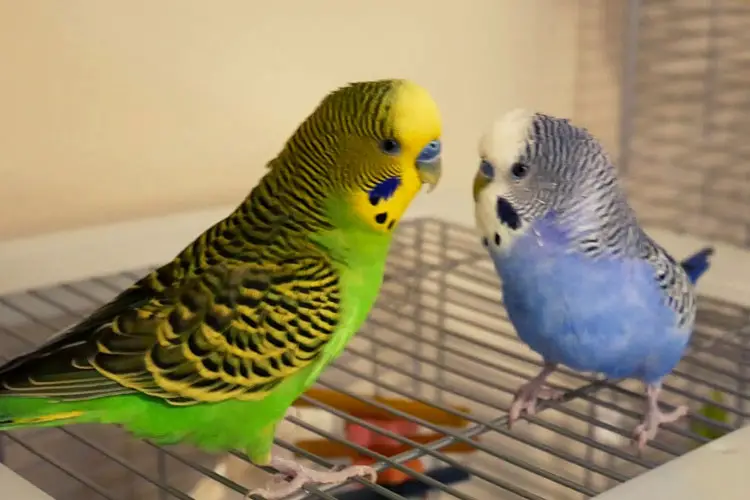Many budgie owners (whether your first budgie or you already own one) concur that the first time you see your pet bird vomit or regurgitate, it terrifies the daylights out of you.
So, Is Your Budgie Regurgitating Or Vomiting? Here’s Why? When a budgie regurgitates, it spits food out of its mouth. Budgies will regurgitate when they are trying to feed other young birds or when they feel fondness for something. However, vomiting is abnormal and indicates that your budgie is ill.
Bird owners must distinguish between regurgitation and vomiting. This article will explain the differences, the reasons for each, and how to treat a budgie vomiting or regurgitating frequently.
Is Your Budgie Regurgitating Or Vomiting? – Vomiting vs. Regurgitation
Vomiting and regurgitation may seem the same, and confusing one for the other is very easy. However, there are some critical differences between the two. So, is your budgie regurgitating or vomiting? Here’s why.
When a budgie is vomiting, it bops/flicks its head fast in an uncontrolled manner and spews out semi-digested food. The food looks foamy and liquid-ish.
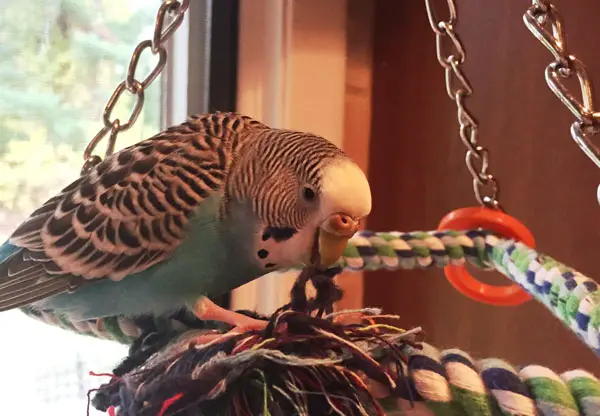
Because the budgie has no control of its body when vomiting, you might find the semi-digested food all over the place or stuck on its feathers.
Vomiting can accompany loose droppings or diarrhea, blood in vomit, sluggishness, ruffled feathers, lethargy, and change in the budgie’s moods.
Remember, the sick bird spews out the stomach contents that it has already digested.
Vomiting is very distressing to a budgie and indicates an underlying problem. It could be a viral infection such as avian polyomavirus or parasitic diseases affecting your budgie’s gastrointestinal tract.
Regurgitation, on the other hand, is a regular behavioral action. When a budgie regurgitates, it bops its head up and down, retracting and extending its neck swiftly, and spits the crop contents that it has not yet digested.
The budgie’s crop is the part found in its esophagus. The crop can expand to accommodate large portions of food. According to research, no digestion occurs in the crop. So that is why when the budgie regurgitates, the food that comes out is undigested
Many budgies do this two or three times a day, so it is common behavior to see if you own a budgie. You will observe that when a budgie regurgitates, it is calm and does not seem stressed.
You will not find any spewed food contents all over the floor because after spitting out the contents, the budgie puts them in another budgie’s or a young one’s mouth.
| Regurgitating | Vs. | Vomiting |
| Budgie bops head up and down | Budgie’s head bops swiftly from side to side. | |
| It is more controlled and precise | Vomiting is uncontrollable. | |
| Budgie spews out undigested food contents. | Budgie spews out digested stomach contents. | |
| It is a voluntary action. | It is the forceful expulsion of food by the budgie’s body. | |
| The budgie remains calm. | The budgie looks stressed and uneasy. | |
| It is normal behavior for budgie to do out of affection. | It is not normal behavior and indicates something is wrong with the budgie. |
What Causes Your Budgie To Regurgitate?
As previously stated, regurgitation is a regular action that budgies do several times daily. There are a few reasons why budgies regurgitate. They include:
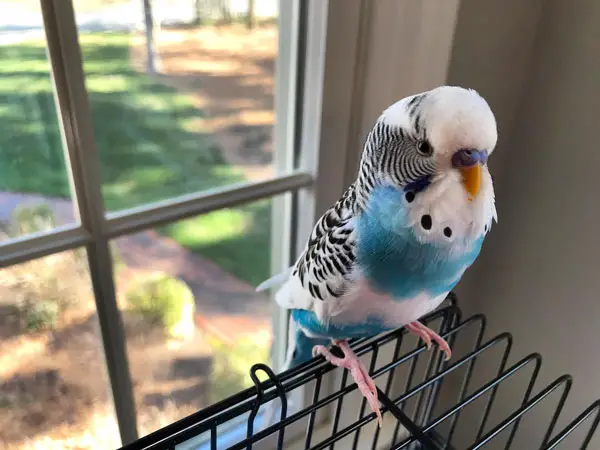
When feeding young ones
When the budgies are young, they cannot go out and fend for themselves. So, a mother bird will feed the chicks with food stored in its crop. Crop food contents are easily digestible by the chicks because when the chicks do not have fully developed beaks that can chew food.
The crop produces crop milk rich in vitamin A, fat, protein, and vitamins such as vitamin B that chicks require to thrive.
Mating
When it is time to nest, budgies regurgitate to attract mates. Regurgitating is a sign of a healthy bird and shows that the budgie can provide food.
If you have male and female budgies in your cage, you will notice that the male regurgitates into the female’s mouth or vice versa; this shows that they are now bonded and can mate.
If female budgies look after their eggs in the wild, they cannot forage for food. So in most cases, the male budgie will look for food and come and spew its crop food into the female’s mouth.
As a way of showing affection
When it is time for budgies to mate, they can be easily attracted to anything around them. Many budgies get attracted to their play toys and even their owners.
As a natural habit, budgies will regurgitate on their mates, but if the budgie is alone or spends a lot of time with you, it will regurgitate on its toys or you.
Budgies also tend to regurgitate on mirrors. Why? Because when they look in the mirror, they see another budgie and do not realize it is their reflection.
Why Is Your Budgie Regurgitating On You?
As we have already established, regurgitation is often a result of courtship behavior. So, if your budgies are attracted to you, they might regurgitate on you whenever you touch them.
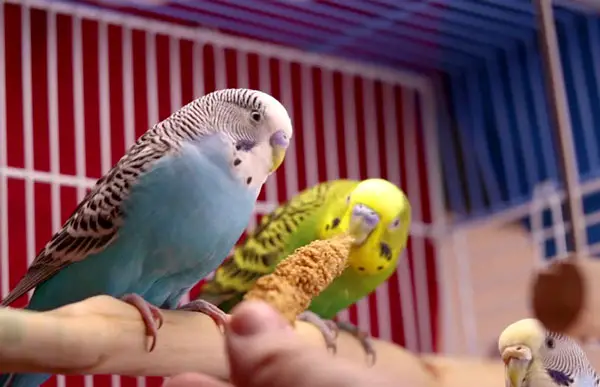
Certain stimuli might trigger budgies’ attraction to their owners,e.g.,
- If the budgie is alone in its cage
- Overexposing your budgie to long periods of light
- Petting your budgie in erogenous areas.
Long periods of exposure to light stimulate a budgie’s breeding hormones. Petting your budgie in erogenous zones can also make it sexually attracted to you.
A budgie’s erogenous zones include its back, under and on top of its wings, tail, especially where the flight feathers are, and legs. If you pet your budgie in these areas, it is triggered to mate and might start getting attracted to you.
Some budgie owners view their budgies’ regurgitating for them as the budgies’ way of showing affection. However, a budgie regurgitating for its owner should be discouraged because it could lead to hazardous results.
Why? As humans, we cannot provide what the budgie needs during its breeding period. So, if you do not stop the budgie from regurgitating for you, the budgie will get sexually frustrated and might start being aggressive and depressed.
Also read: Budgie Attacking Other Budgie
How Do I Stop My Budgie From Regurgitating On Me?
To avoid your budgie being aggressive and depressed, you have to stop it from regurgitating on you. Here are some tips you can use.
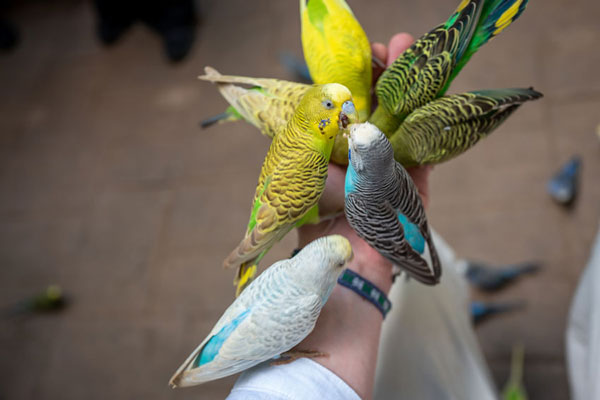
- If your budgie regurgitates on you, put it back in its cage and ignore it. This will make the budgie see that you are not interested in its advances.
- Ensure your budgie gets 12 hours of sleep in darkness. Overexposure to light triggers the budgie into thinking it is breeding season.
- If the budgie is alone, you can add a second budgie; that way, the budgie does not feel lonely.
- Be cautious about petting your budgies; ensure you pet your budgie only on top of its head. Avoid its erogenous areas. Sometimes it might be the way you play with your budgie or a phrase you use when talking to your budgie that might be causing the budgie to regurgitate.
Evaluate your interaction with your budgie and eliminate any triggers that cause it to regurgitate. Come up with other ways of playing with the budgie.
- When it’s breeding season, remove toys and mirrors to which your budgie might regurgitate.
What Causes Your Budgie To Vomit?
Unlike regurgitation, vomiting in birds is not a natural behavior. Vomiting should be taken very seriously, and take the budgie to a veterinarian.
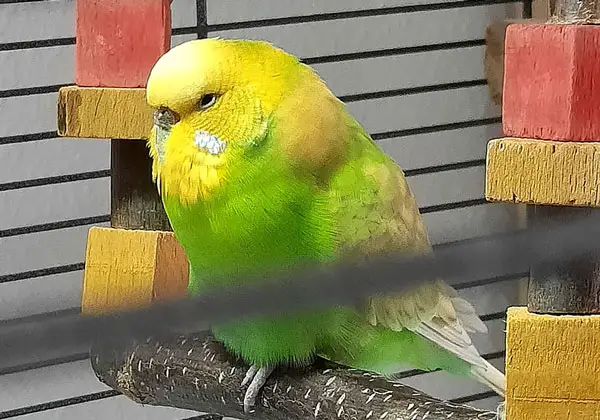
Vomiting can be due to;
- Fungal infections, viral or bacterial infections
- Gastrointestinal diseases; cause your budgie to vomit and appear ill.
- Consumption of spoiled food.
- Certain food allergies or reactions to drugs
- Irritation in the digestive tract.
- Sudden dietary changes
- Diseases such as diabetes, liver disease, and kidney illness
- Overeating or drinking too much water
- Crop burn or esophagus blockage; if your budgie swallows foreign bodies, they could cause blockage in the crop.
Vomiting is accompanied by a lack of appetite, diarrhea, blood in vomit, watery eyes, and sleepiness. These are not symptoms you can treat at home so ensure your pet budgie gets veterinary care promptly.
Related Questions
Here are other frequently asked questions.
Regurgitating for a budgie is normal. However, constant regurgitation should be considered a sign of illness. If a budgie constantly regurgitates, it could be caused by a yeast infection, consumption of foreign objects such as heavy metals, or if the budgie’s crop is infected.
The only thing you can do for a vomiting bird is to take it to a veterinarian. A vet will then advise you on what to do after they come up with a diagnosis.
When a budgie regurgitates, its head flicks up and down while its neck retracts and extends to bring out undigested food from its crop. It is a voluntary action, so the budgie looks calm.
Related: How Often Do Budgies Lay Eggs?
Conclusion
So, in regards to is your budgie regurgitating or vomiting? A budgie regurgitating is normal while vomiting isn’t. If your budgie is vomiting, you should take it to a veterinarian for a medical checkup.
Regurgitation happens when the budgie is attracted to its mate, an object, or owner. However, you should discourage your budgie from regurgitating on you to avoid long-term effects. Other than that, regurgitating is normal for budgies.
Now you know the differences between regurgitating and vomiting.
